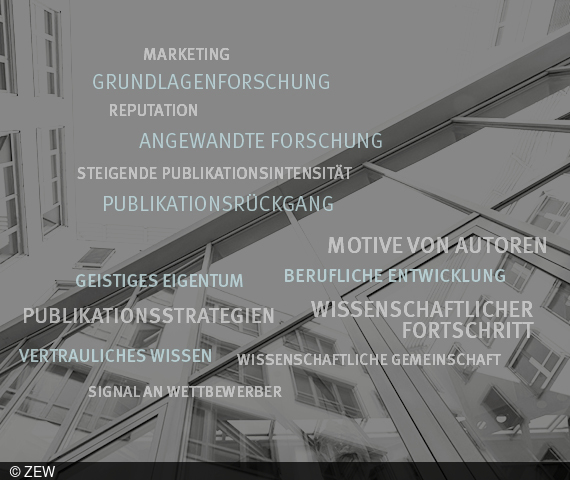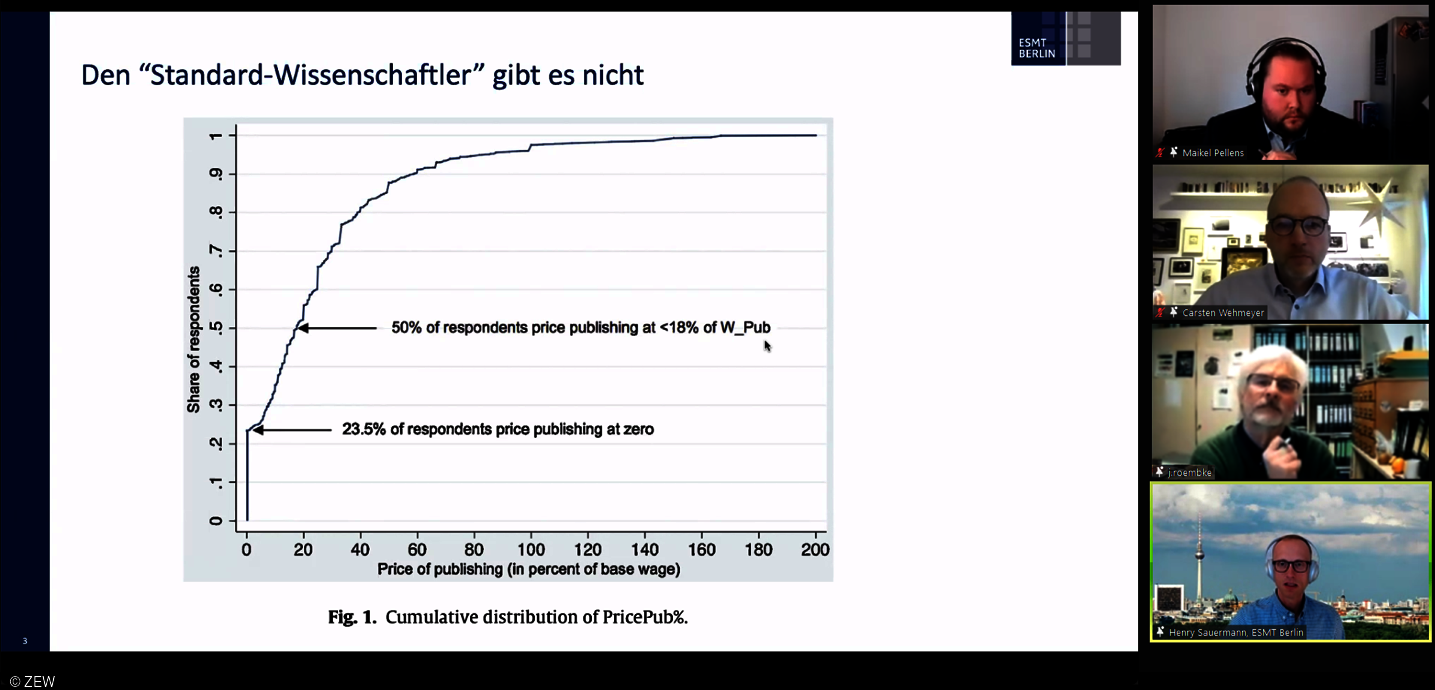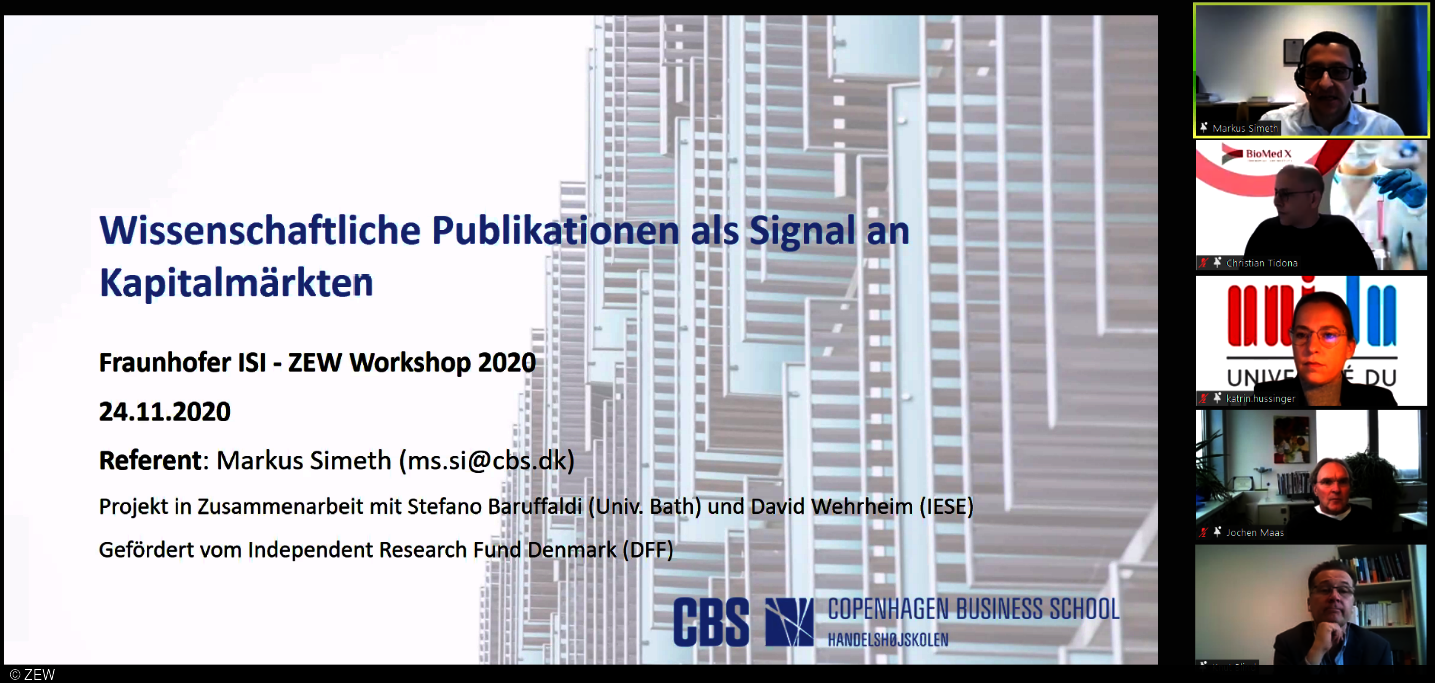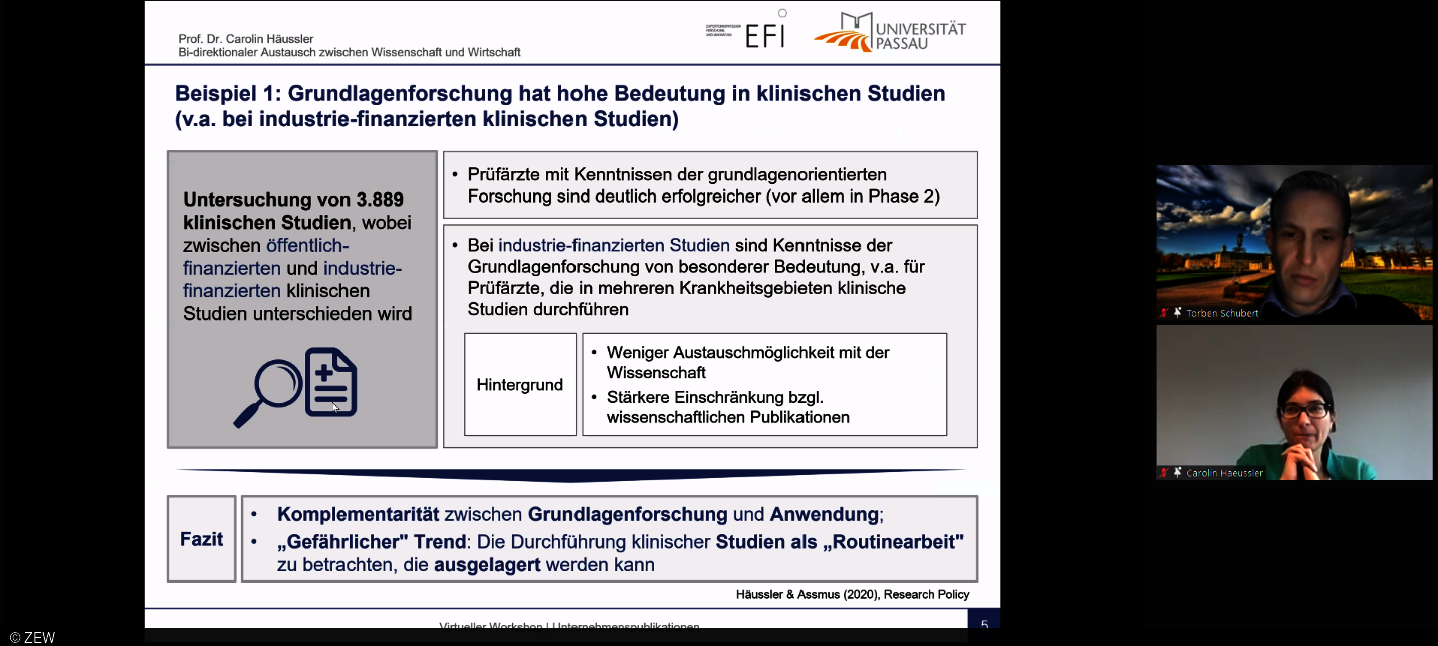Why Do Firms Publish Their Research?
WorkshopZEW/ISI Workshop on the Exchange Between Research, Businesses and, Policymaking
Why do company workers publish in scientific journals? What motivates firms to publish papers, what prevents them from doing so? Which role do corporate publications play for the innovation system and innovation policy? These are some of the questions addressed at an online workshop, which was jointly organised by ZEW Mannheim and the Fraunhofer Institute for Systems and Innovation Research (ISI). The workshop, which took place on 24 November 2020, was supported by the Federal Ministry of Education and Research.
The event provided a great opportunity for the approximately 50 participants to engage in discussion with representatives from businesses, associations, research and policymaking. As part of the workshop entitled “Wissenschaftliches Publizieren in Unternehmen: Entwicklungen, Motivationen und Herausforderungen” (“Scientific Publishing by Firms: Developments, Motives and Challenges”), experts discussed the publishing behaviour of firms from different perspectives in three panel sessions.
In the introductory speech, Torben Schubert, deputy head of the Competence Center “Innovation Knowledge Economy” at the Fraunhofer ISI and professor at Lund University, Sweden, gave insights into the structure and the key findings of the project “Motives to Publish: Patterns, Strategies and Motives for Scientific Publishing by Firms”, which provided the background for this workshop. First findings of the project show that a significant number of German companies are involved in academic publishing. While corporate publication activities have overall remained stable over the past 15 years, the structure of these activities has changed: There are less companies that produce scientific publications, the number of firms that publish together with scientific institutions has risen, as has the share of corporate publications that focus on basic research.
The first panel session was moderated by Maikel Pellens, visiting professor at Ghent University in Belgium, and focused on the perspective of employees. Professor Knut Blind from TU Berlin, who works as head of the Business Unit “Innovation and Regulation” at Fraunhofer ISI, moderated the second panel sessions, which discussed publishing from the point of view of the companies themselves. The third and final panel session focused first and foremost on the role of corporate publications for the innovation system and innovation policy, and was moderated by Professor Torben Schubert.
Why do company workers publish in scientific journals?
In his presentation, Henry Sauermann, professor at ESMT Berlin, explored the assumption that workers from scientific backgrounds have a general interest in publishing the results of their work. Against this backdrop, Sauermann and his co-author Professor Michael Roach examined the importance of scientific publishing among more than 1,900 PhD candidates in the US. The study shows that scientific publishing often plays a less important role for doctoral candidates who wish to pursue a career in industrial R&D divisions. PhD candidates at top universities who rated themselves as high-performers, on the other hand, expect to receive significant compensation from their employers if they are to give up academic publishing.
Dr. Carsten Wehmeyer, who works in the department of digitalisation and innovation at the Federation of German Industries (BDI) presented personal motives for scientific publishing. In preparation for the workshop, he carried out a quick poll among his co-workers and BDI member companies to gain insight into their motives to publish research papers. The most frequently mentioned motives were curiosity and the pleasure to engage in academic work, whereas receiving compensation from their employers and the positive effect on their career prospects played only a minor role for the participants. The lack of time for research and writing is perceived to be the greatest obstacle to scientific publishing, but the lack of recognition and support by the employers were also found to play a role.
Dr. Jörg Römbke, managing director and co-founder of ECT Oekotoxikologie GmbH, provided insights from the perspective of a medium-sized testing laboratory. As part of its activities, the company publishes new ecotoxicological methods with the aim of contributing to the development of new testing standards. At the same time, however, the confidential nature of the test results also limits the workers in their ability to publish their research. Römbke, who has published numerous papers, highlighted that the publishing process also creates added value in the form of a deeper understanding of the subject matter.
The discussions during the first panel session revealed that targeted measures that reduce obstacles to scientific publishing are highly important. As measures that could support research in the publication process, the participants suggested agreeing on publishing targets for certain groups of workers and specifying concrete requirements in job postings and assignments. On the other hand, supporting scientific publishing as a general rule was viewed in a critical light: some staff, involved in confidential non-publishable projects, would be in a disadvantaged position, argues Römbke.
What motivates companies to publish research articles?
As part of the second panel session, Professor Katrin Hussinger from the University of Luxembourg held a keynote speech, where she emphasised that 50 per cent of companies who have listings on the New York Stock Exchange publish information on their R&D activities. This allows them to provide their investors with information and prevent low credit ratings. Markus Simeth, assistant professor at the Copenhagen Business School in Denmark, also highlighted the significance of scientific publications in this process. In a study conducted among US enterprises for the period from 1997 to 2014, he found that enterprises increase their number of scientific publications, if they lose analysts who report on their performance. This is particularly the case for firms that require external funding and shows that publications act as signals on capital markets.
Katrin Hussinger provided further insights into the motivation of small and medium-sized enterprises to share information on their research and development. According to Hussinger, these companies use publications to build their reputation, attract investors and find cooperation partners. Adding to this list, Dr. Christian Tidona, founder and managing director of BioMed X, provided further explanations from the perspective of a private clinical research institute. As part of its business model, the Heidelberg-based institute has the aim of recruiting excellent researchers from all over the world in the early stages of their careers and integrating them into the regional network of enterprises and research institutions. Scientific publications are crucial for this recruitment process, as this signals the company’s research expertise. In addition, the firm supports its researchers in their efforts to publish their work, which makes it easier for them to return to the academic sector at a later point in time.
In his presentation, Professor Jochen Maas, head of the R&D division at Sanofi-Aventis Germany, shows how publishing and patenting both contribute to the overall intellectual property rights strategy of a firm. Firms can, for instance, acquire patents for their key technologies and publish papers on similar technologies at the same time in order to prevent their competitors from pursuing similar patents. In addition, he highlighted the significance of the feedback function of scientific publishing: According to Professor Maas, successful publications act as a signal for high-quality academic work, providing potential customers with a reliable source of information on company products and technologies. Katrin Hussinger also discussed this approach of combining corporate publishing and property rights strategies. Together with Dr. Antonio della Malva from KU Leuven, she presented a study showing that companies can prevent other firms from filing patent applications if they are involved in scientific publishing.
In the subsequent panel debate, the participants further discussed what hinders companies from publishing academic publications, concluding that the risk of accidentally passing on internal knowledge to competitors and the accompanying weaker competitive position are the biggest threats in this regard. It is therefore important to put in place internal processes in order to verify the results before they are published, which could, however, slow down or even prevent the publication process. The participants also discussed internal management systems to ensure scientific standards, further training measures as well as the creation of specific positions in firms.
What role do corporate publications play for the innovation system and innovation policy?
Carolin Häussler, professor at the University of Passau and member of the Commission of Experts for Research and Innovation (EFI), held the introductory speech for the third panel session, where she spoke about the importance of the bidirectional exchange of information between science and businesses. According to the results of a study, there has been a rise in the average number of scientific citations in corporate patent applications, which reflects the increasing importance of knowledge held in scientific publications for the development of new technologies. In a new study, Häussler and her co-author found that clinical research physicians with expertise in the area of basic research tend to be more successful in clinical studies than physicians without such expertise, which highlights that basic and applied research complement each other.
In his presentation, Andreas Knie, head of the Research Group “Digital Mobility and Social Differentiation” at the WZB and professor at TU Berlin, examined the varying roles of researchers assumed in the transfer of knowledge. He distinguished between researchers that assume the classical role of an observer in the innovation system and scholars that intervene actively in this process with the aim of initiating change in politics or firms. His suggestion for scientific journals is therefore that they should be open towards applied studies and research that is relevant to society, which are often conducted in corporate settings.
In his keynote speech, Ministerial Director Engelbert Beyer, head of the section “Application-Oriented Research for Innovation” at the Federal Ministry of Education and Research, addressed the issues discussed during the workshop and brought them into relation with current regulations of the ministry, namely with the Auxiliary Terms and Conditions for Funds Provided (“Nebenbestimmungen für Zuwendungen auf Kostenbasis” – NKBF). As part of these terms and conditions, firms are required to submit and publish a research report on the results of the funded project. At the same time, however, this measure does not create explicit incentives to publish further research results, which means that the insights remain inaccessible to and cannot be further developed by other parties. Since interventions in corporate publishing strategies by donor institutions should be viewed in a critical light, the question remains whether public authorities should create additional incentives for scientific publishing. However, with the programme “Research Campus“, the Federal Ministry has, for instance, adopted a measure that encourages cooperation between businesses and academia and that has produced numerous collaborative publications.
Conclusion: Research policy must be designed in a flexible way
Emphasising the heterogenous nature of scientific publishing in firms, Knut Blind summarised the main results of the three panel sessions:
- The factors that motivate researchers in companies to publish scientific articles are very heterogenous and can also change over the life course of the researchers.
- Corporate publication strategies and activities are highly specific depending on the various industries and can vary according to the size of the company and the business model.
While there has been a trend towards convergence in the way firms and research institutions publish and patent their research work in the area of life sciences, the publishing activities in, for instance, the German automotive sector remain on a rather low level. To remedy this, research policy should place greater emphasis on the option of scientific publishing – with or without the involvement of firms – and should in general be designed in a highly flexible way.
The workshop “Wissenschaftliches Publizieren in Unternehmen: Entwicklungen, Motivationen und Herausforderungen” (“Scientific Publishing by Firms: Developments, Motives and Challenges”) was organised within the framework of the project “Motives to Publish: Patterns, Strategies and Motives for Scientific Publishing by Firms” funded by the Federal Ministry of Education and Research.




